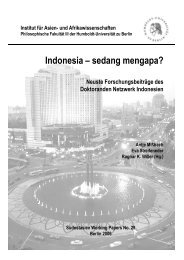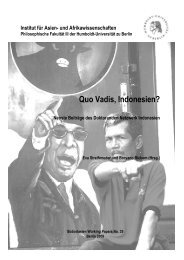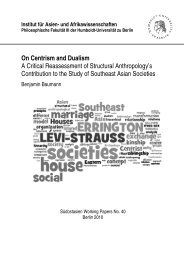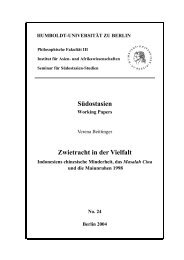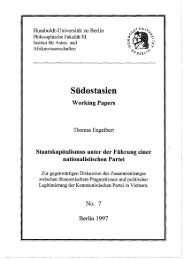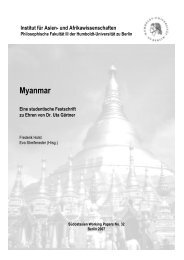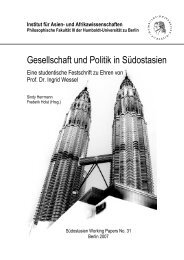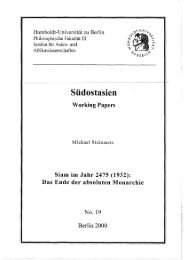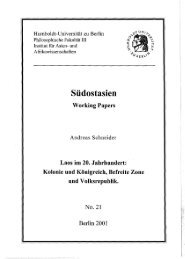Connecting the Philippines and Germany - HU Berlin
Connecting the Philippines and Germany - HU Berlin
Connecting the Philippines and Germany - HU Berlin
You also want an ePaper? Increase the reach of your titles
YUMPU automatically turns print PDFs into web optimized ePapers that Google loves.
Martin de Rada who described <strong>the</strong> indios as assassins, thieves, highwaymen, <strong>and</strong> cowards. Rizal belittled<br />
de los Reyes’s scholarship by claiming that he had used a mere French translation of a manuscript,<br />
while he had used <strong>the</strong> original.<br />
Rizal claims he had read all <strong>the</strong> early accounts of <strong>the</strong> <strong>Philippines</strong>, cover to cover, except that of<br />
Plasencia, which was unavailable. “I never state anything on my own authority,” Rizal notes. “I cite<br />
texts <strong>and</strong> when I cite <strong>the</strong>m, I have <strong>the</strong>m before me.” 56<br />
Although de los Reyes did not have <strong>the</strong> opportunity to spend as much time as Rizal in <strong>the</strong> British Museum,<br />
he was, none<strong>the</strong>less, thorough in his research for Historia de Ilocos: he “read more than a hundred<br />
historical <strong>and</strong> non-historical works, just to cull two or three items from each of <strong>the</strong>m.” He supplemented<br />
archival research by utilizing “oral traditions for more recent events.” 57 Notwithst<strong>and</strong>ing<br />
this, Rizal cites Pigafetta, Chirino, Morga, Argensola, Colin, San Agustin, <strong>and</strong> Aduarte, rallying all his<br />
sources against <strong>the</strong> one main source of de los Reyes, pronouncing proudly that<br />
“As I based my assertion on seven contemporary writers, I do not know if in this case, I shall be <strong>the</strong><br />
exception <strong>and</strong> de los Reyes <strong>the</strong> general rule. I know that <strong>the</strong> authority of de los Reyes is worth seven<br />
times more than mine; but with my seven authors <strong>and</strong> he with his Fr. Rada, we can balance ourselves,<br />
if he does not take offense...dealing with historical facts, only <strong>the</strong> testimony of contemporaries can be<br />
authoritative, a testimony that ought to be subjected to <strong>the</strong> processes of criticism.” 58<br />
Rizal is being petulant in bragging about his familiarity with primary sources: but significantly, this<br />
sour exchange offers an important insight into Rizal’s views, especially into his Tagalog-centered<br />
view of history. Beneath this historiographical argument lies not scholarship or <strong>the</strong> reliability of<br />
sources, but patriotism. History must be used for a purpose, not only to enlighten but to make his<br />
countrymen “think correctly,” to see history not from <strong>the</strong> viewpoint of <strong>the</strong> Spanish chroniclers but<br />
from <strong>the</strong> indios’s point of view. Rizal concludes his tirade by washing his h<strong>and</strong>s:<br />
“Let it be put on record that this question was provoked by Mr. de los Reyes, that until now I have<br />
only spoken of him with admiration <strong>and</strong> respect, even if I do not agree with his opinions, for I have<br />
always believed that I could not raise myself to be his judge.” 59<br />
Earlier in <strong>the</strong> essay, Rizal unconsciously unveiled his view of committed scholarship: “...had we no<br />
positive proof of de los Reyes’s patriotism, we would believe that by giving so much credit to Fr.<br />
Rada, he had intended to denigrate his own people.” 60 This is an important point, because it shows that<br />
Rizal was an early exponent of “committed scholarship,” to use a current term, which saw nothing<br />
wrong in driving data into a particular framework, or giving <strong>the</strong> narrative a particular bias to push<br />
home a point. Rizal, blinded by his patriotism, as de los Reyes aptly put it, forgets <strong>the</strong> true purpose of<br />
scholarship, distorting truth to suit <strong>the</strong> needs of propag<strong>and</strong>a against <strong>the</strong> Spaniards <strong>and</strong> <strong>the</strong>ir particular<br />
interpretation of Philippine history.<br />
The ambiguity in Rizal becomes very clear in this little known essay against de los Reyes. Rizal was<br />
not seeking to be a scholar or historian; he was merely using history as a weapon for <strong>the</strong> propag<strong>and</strong>a<br />
movement. Juan Luna wrote to Rizal immediately after reading “Una contestación á I. de los Reyes.”<br />
in La Solidaridad, warning him that public disagreements between <strong>the</strong> propag<strong>and</strong>ists was counterproductive<br />
as it was giving <strong>the</strong> Spaniards “a great laugh.” Luna said that de los Reyes was also his<br />
friend, but he had done wrong by refuting Rizal’s annotations to Morga, “which are exaggerated by<br />
56 Loc cit.<br />
57 Scott, Op. cit. p.246. rotten beef <strong>and</strong> stinking fish: Rizal <strong>and</strong> <strong>the</strong> writing of Philippine History 111<br />
58 Loc cit.<br />
59 Rizal-de los Reyes, Op cit<br />
60 Loc cit.112 rotten beef <strong>and</strong> stinking fish: Rizal <strong>and</strong> <strong>the</strong> writing of Philippine History<br />
21



